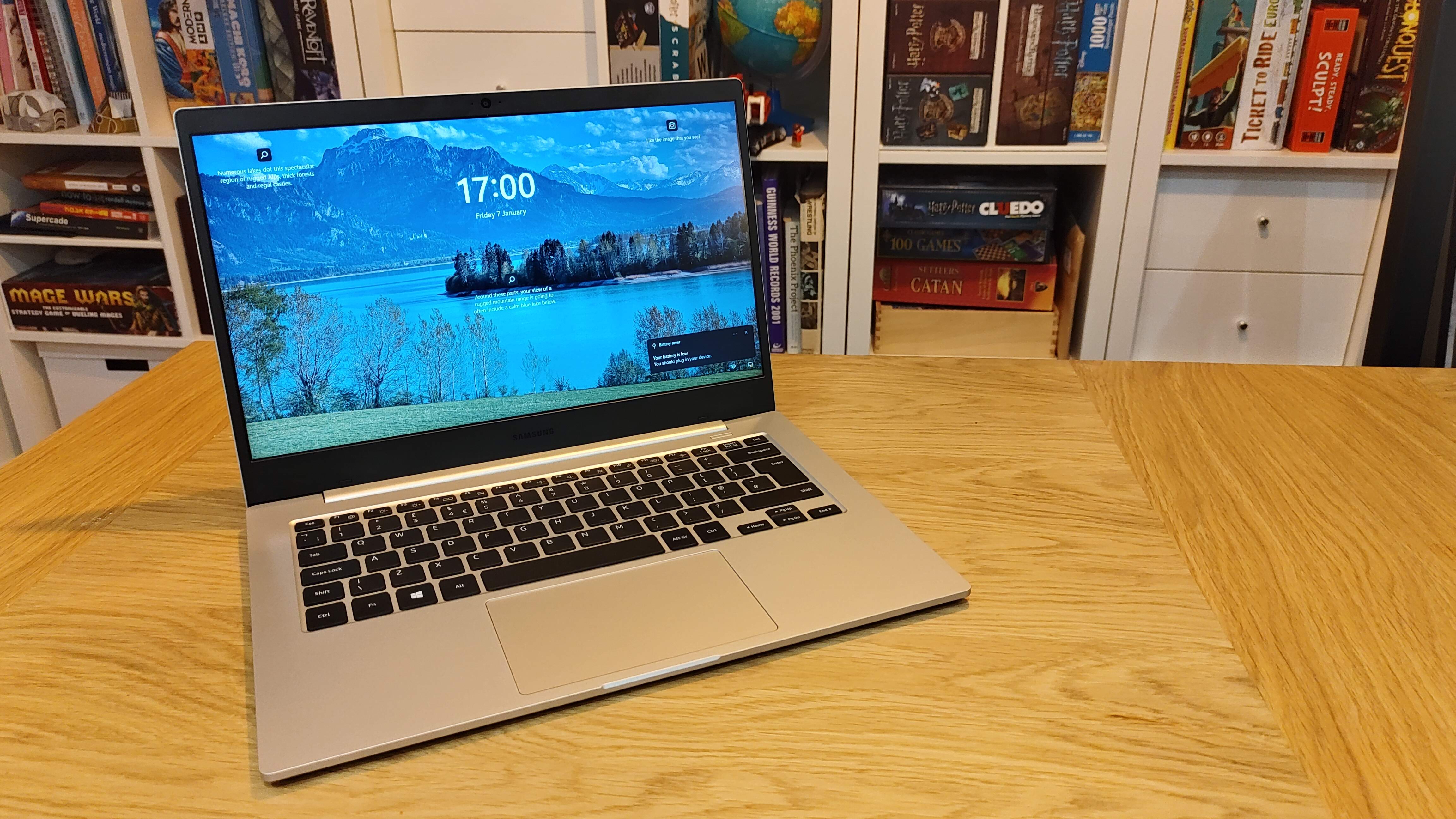TechRadar Verdict
Very disappointing. Windows on ARM plays nicely only with a handful of apps - and besides, you can barely see it through the Galaxy Book Go's cloudy screen.
Pros
- +
ARM-compiled apps are fast
- +
Incredible battery life
- +
Instant-on is great
Cons
- -
Abysmal screen
- -
Sluggish in many situations
Why you can trust TechRadar
Editor's Note
• Original review date: January 2022
• Launch price: Starts at $349 / £349 (around AU$490)
• Target price now: Starts at $349 / £349 (around AU$490)
Update – September 2024: Well, it looks like our reviewer was bang on the money back at the start of 2022; Windows on Arm really did just need some more time in the oven, as I noted that Samsung's new Galaxy Book4 Edge was able to play modern games thanks to its powerful Snapdragon X Elite chip.
There was an interstitial update to this laptop in February last year with the Galaxy Book2 Go, but that model still used the older Snapdragon 7C+ chip and suffered from the same Windows compatibility issues as the version reviewed below. With no new iteration this year, it's possible that the Book Go series might be dead - never say never, though.
You can still pick up the original Samsung Galaxy Book Go from most retailers (chiefly Amazon) for roughly its original launch price, since the Book2 Go arrived with a higher entry price. But at this point, there's little reason to recommend it over any of the best ultrabooks.
Original review follows.

Two-minute review
We have to imagine that, some time in 2016 or 2017, Samsung gleefully signed on to the Windows on ARM program, a move which eventually led to the Samsung Galaxy Book Go. We'd also have to imagine that Samsung is not feeling nearly as gleeful right now, because whatever Windows on Arm is supposed to be, the Galaxy Book Go just isn't it.
Its failures aren't only the fault of the Snapdragon processor at its heart. That chip sure does its darnedest, and works at a decent clip when running things which are pre-baked to support it. It runs cool, the machine is super-quiet, and the phone-esque features that such a chipset brings (notably instant-on and ridiculous battery life) are a real highlight here. But challenge it in any way and it crumples.
Whatever compatibility layer Windows 11 has implemented for x86 apps is generally pretty poor, which we somewhat expected. But we expected slightly more snappiness on the desktop; the 4GB RAM package in this laptop just isn't enough to do more than one or two things at a time. This is a machine that looks for all the world like a normal Windows laptop, but doesn't have the pop where it counts - even at the very reasonable price point.
Samsung's attempts to hit that price have also led to some serious sacrifices in the hardware department. The screen, notably, reaches a commendable 1080p resolution, but is utterly terrible in every other way. The case is bouncy plastic which does not exactly fill us with confidence. The ports are passable but honestly pretty lacking in options. The LTE connectivity is not 5G, and if Samsung's own Galaxy A13 can manage it for far less money, it's a real shame that this can't. Admittedly Qualcomm's exclusive contract for Windows on ARM means Mediatek's cheaper chipsets don't get a chance to shine, but we're still annoyed.
Ironically, it's only the familiarity of Windows that really saves this. You can, with luck and a big asterisk, run whatever Windows apps you need, something a Chromebook can't offer. If you're careful with your tab management you might even find this to be a reasonable tool for using online apps. But the Galaxy Book Go is far from a productivity powerhouse. Pick one up and we'd imagine you'll feel the same kind of buyer's remorse as Samsung must be feeling for going down this path in the first place.
Price and availability
Here is the Samsung Galaxy Book Go configuration sent to TechRadar for review:
CPU: Snapdragon 7c Gen 2 (Kryo 468 Octa-core CPU, up to 2.55 GHz)
Graphics: Qualcomm Adreno
RAM: 4GB LPDDR4x
Screen: 14-inch 1920 x 1080
Storage: 128GB eUFS
Ports: 2x USB 3.0 Type-C ports, 1x USB 2.0 Type-A port, micro SD reader, nanoSIM, audio combo jack
Connectivity: Bluetooth 5.1, 802.11 ac (2x2), 4G LTE
Camera: Built-in 720p webcam
Weight: 3.04 pounds (1.38 kg)
Size: 12.75 x 8.85 x 0.59 inches (32.3 x 22.4 x 1.49 cm; W x D x H)
While it's not the most ultra-cheap laptop in the world, the 4GB spin of the Galaxy Book Go supplied to us for review lands squarely in the budget bracket at $349 (£349, around AU$490). That said, we can find no evidence of it being officially available in Australia - though stocks seem plentiful elsewhere.
That's a magic number: it puts the Galaxy Book Go head-to-head both with a good number of Chromebooks, including Samsung's own Galaxy Chromebook Go, with which it shares much of its hardware design. It also puts it up against the lowest reaches of the x86 market - somewhere a Windows-on-ARM laptop might not really want to be.
It's more pricey than, say, the Lenovo Ideapad Duet, a double-duty tablet which realistically offers a lot more flexibility; it's also fairly equal with the Microsoft Surface Go which, even a year on, remains a solid performer.
So the Samsung Galaxy Book Go has its work cut out for it. It has to throw around Windows on a platform which might better suit a Linux or Android environment - something those two competitors don't have to worry about. It has to offer enough non-touch laptop to be worthy of a price point which can get you a fairly solid two-in-one machine. Can it do it? Well, no. And here's why.
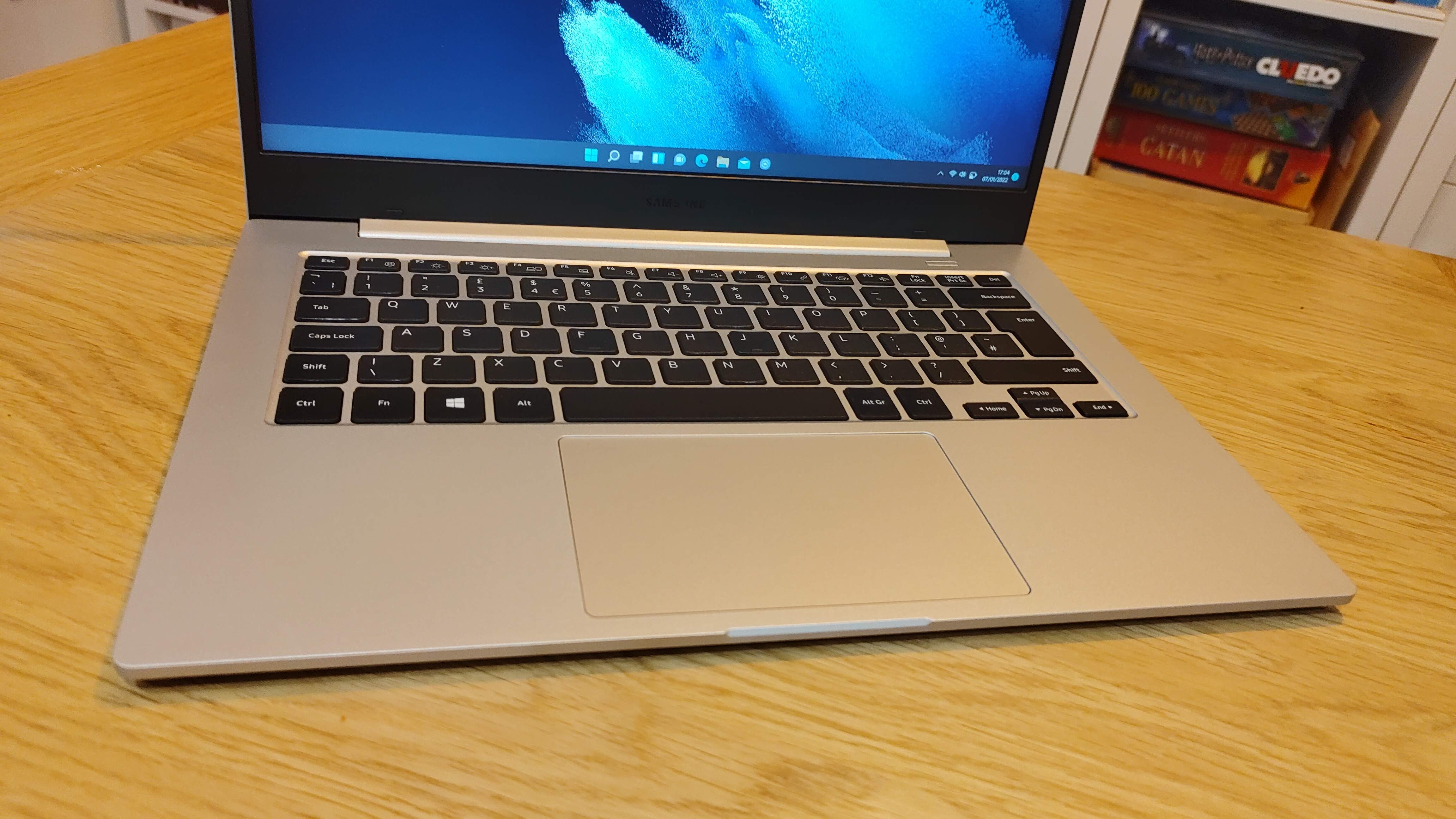
Design
Samsung hasn't gone mad with the Galaxy Book Go's design: this is pure, plain, silver'n'black functionality laid bare.
That's absolutely fine. It's thin enough, inoffensive, and sized just right, with reasonably thin side bezels giving it an impressively compact footprint - and we'll forgive its chunky chin and forehead, as the extra vertical reach stops the control surface ending up too cramped.
There's even a discrete power button, in these days of all and sundry moving that function to the top right of the keyboard. It feels sad to offer points for such a minor feature, but here we are.
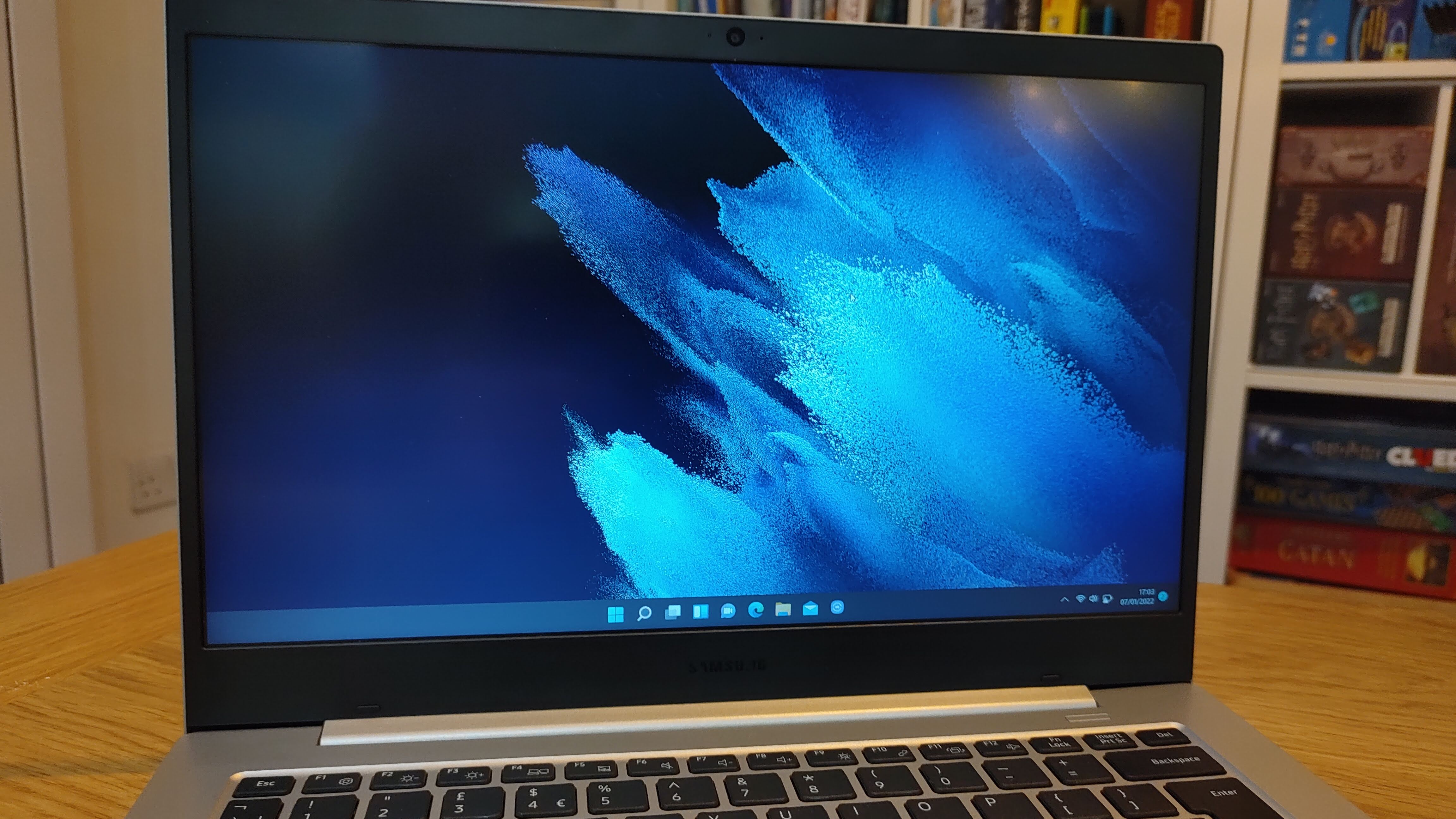
The matte-finish screen is, even considering that its 1080p resolution tops most other machines of this price, absolutely horrendous. It is so low-contrast it feels like you're peering through smoke to look at it, the colors are terrible, and while it's not overly smeary at speed you can absolutely feel the 60Hz refresh rate.
It's also attached to such a weak and flexible lid that touching it - or even typing particularly vigorously - causes little LCD wobbles in the bottom corners suggesting the panel is under some serious tension.
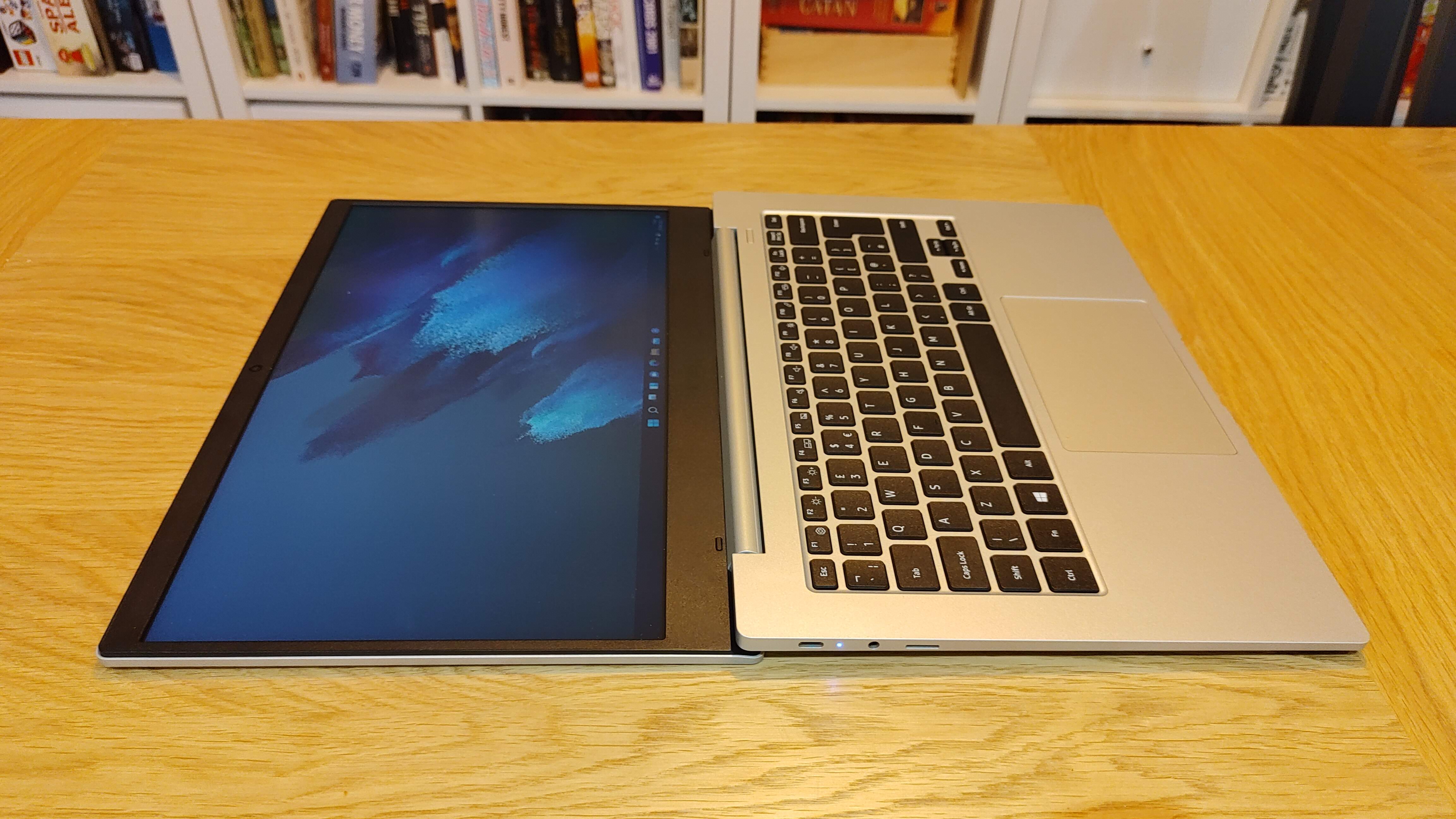
Its hinge is somehow both stiff and wobbly. It's slightly too rigid to open one-handed, fixes the position nicely when open, but allows enough play that using it on your lap sees it bouncing around. On a desk things aren't so bad, however.
There's similar cut-corner flexibility on the base. The keyboard deck is soft and springy (though there's some solid travel on its keys) and the trackpad is standard cheap-and-cheerful fare. None of this affects the Galaxy Book Go's functionality, and we had no problems typing this review or mousing around, but there's no getting around the downsides of the price point: magnesium alloy stiffness this ain't.
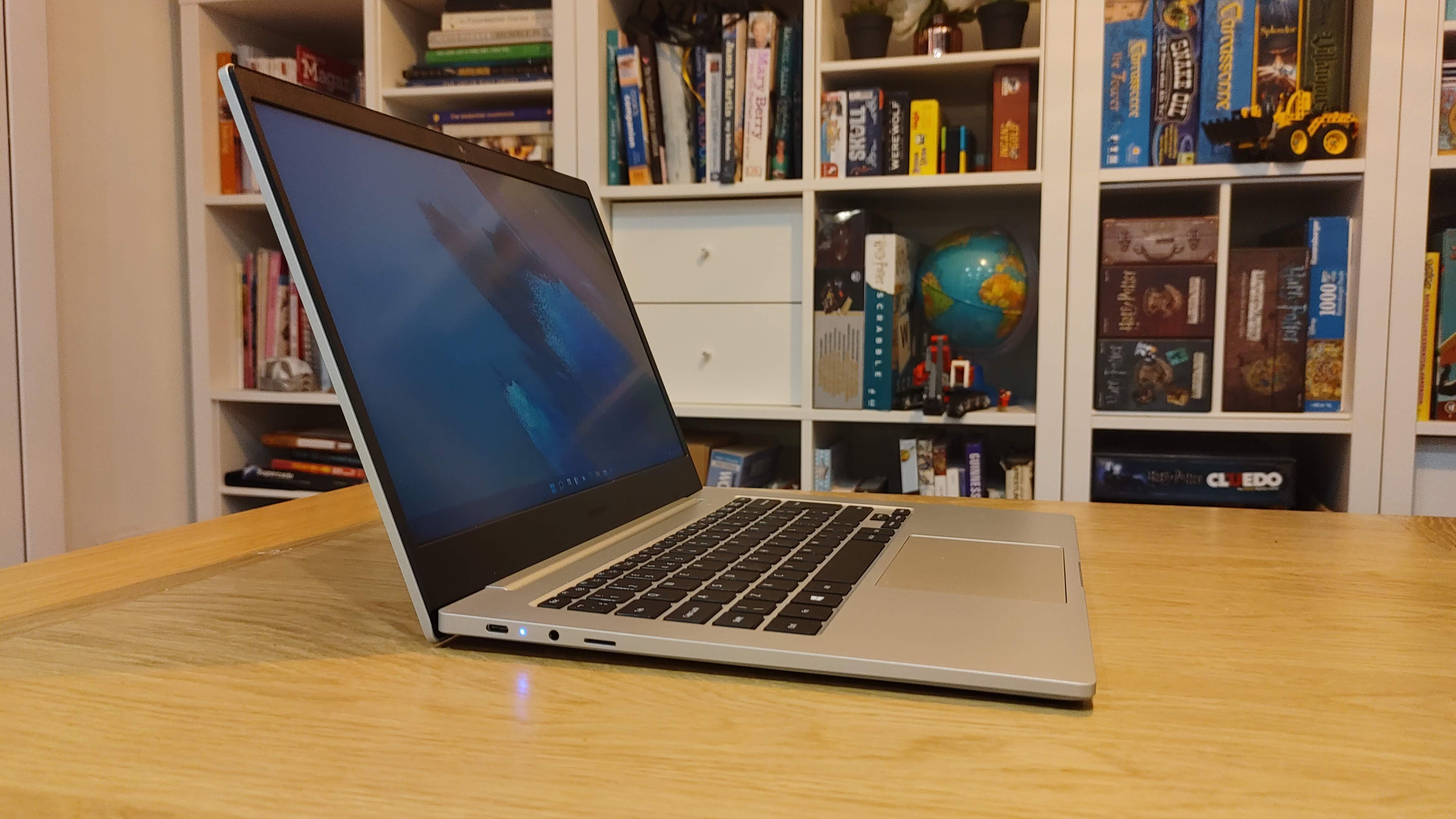
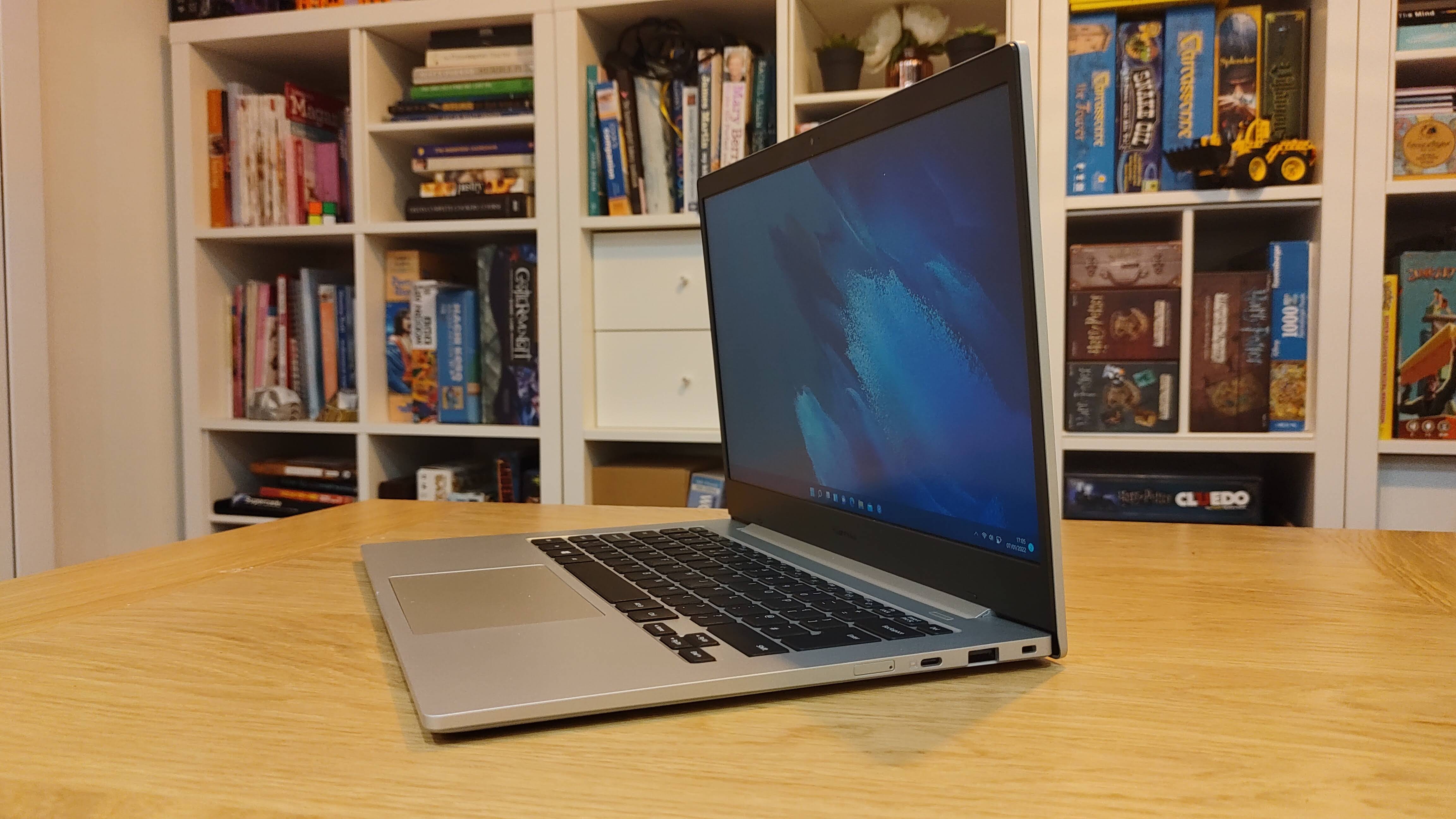
In terms of ports, things are fairly basic. The left edge offers up a USB 3.0 Type-C port (for charging and data) along with a combined audio jack and a microSD reader, while the right edge contains another Type-C port (the only one capable of video output) as well as a USB 2.0 Type-A port, a Kensington lock slot, and a NanoSIM cradle for LTE connectivity.
An extra Type-A port might have been nice - and HDMI output is sorely lacking - but modern problems require modern solutions, and you'll have to work with Type-C if you want to hook up an external display.
The unit itself is, given its mostly flimsy plastic outer, surprisingly weighty. We'd have to presume there's either a heavyweight passive cooler or a huge battery inside, or perhaps both. This feels like every bit of its 1.38kg - it's not a shoulder-breaker by any means, but you'll notice it in your bag.
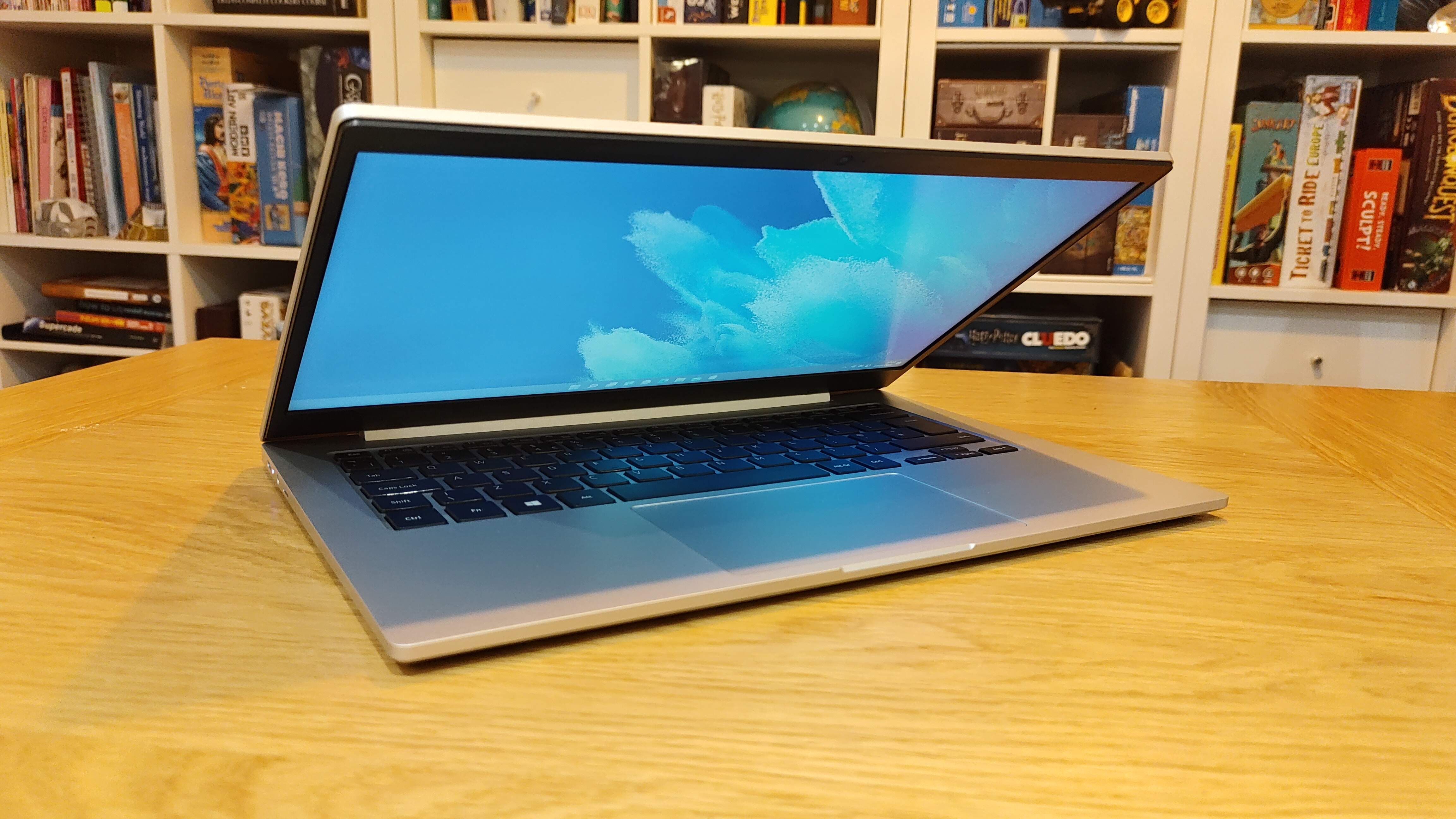
Performance
Here's how the Samsung Galaxy Book Go performed in our suite of benchmark tests:
Mozilla Kraken 1.1: 1927.3ms
JetStream 2: 55.851
Geekbench 5 CPU Benchmark: 508 (Single-Core); 1399 (Multi-Core)
Cinebench R20 Multicore: 359
Battery life (Techradar Movie Test): 11hrs 30mins
Windows on ARM, then. Frankly, simply knowing that this is a Windows on ARM device, you'll probably have formed your own opinion about what the Galaxy Book Go is capable of - the good news is you're right, whatever you might think. Except when you're not.
Do you think ARM is more at home on phones, tablets, or operating systems built around it like macOS? Bang on: while Windows 11's core functions are snappy enough if the processor isn't overburdened, it's very easy to find ways to push the Galaxy Book in the wrong direction and fall foul of the not-so-quick translation layer.
Sometimes things get very syrupy; Google Chrome, for example, doesn't yet have a native app, and ran terribly. Few things we tried entirely refused to run, meaning this is a far cry from the dark days of Windows RT, but we'd suggest you shouldn't buy this if there's something you specifically want to do outside of a web browser which isn't Chrome, which is a pretty ridiculous statement to make of a Windows laptop.
On the flip side, certain things genuinely surprised us. For example, less demanding 2D indie games built for traditional PC processors ran pretty smoothly, though 3D is something of a test too far.
Think Windows on ARM basically turns a laptop into a phone? Right again, kinda: Qualcomm's mobile processor expertise makes phone-adjacent functions work superbly well.
This is a machine meant for monumental battery performance, something we'll get to shortly, but also one which instantly wakes from sleep with all of your radios already connected. It runs silent and stays cool even when you're doing entirely too much. For a functional budget laptop, that's ideal - and almost unique to this category. Samsung also includes a whole bunch of ecosystem apps which tie this nicely to its own phone line, though you'll find a lot more performance with your phone docked in DeX mode, which renders them somewhat moot.
Think scaling up what is essentially phone hardware to run a full laptop isn't going to work? First, you shouldn't overlook the MacBook, which makes magic with its M1 chip, but in the case of the budget-priced Galaxy Book Go you're not entirely wrong.
4GB RAM gives this less memory to work with than even many budget phones, and it's not hard to push it to the cap if you're not frugal with your browser tabs. But again, we were relatively surprised: whatever the middling benchmarks might suggest, there's enough power here to see you through your day-to-day browsing, work and mild entertainment, as long as you're happy to stay in your lane.
That's where your expectations should end; were you to ask more than that from this, you'd be as disappointed as you would be of a basic x86 machine at the same price. Passable is the word of the day. The down-firing speakers are loud but lack clarity, making Samsung's choice to license Dolby Atmos confusing at best. The webcam is fine, but completely unspectacular and easily blown out by bright lights. The LTE connectivity is a nice touch, but it's a clear generation behind.
The benchmark results bear our real-world experiences out. Cinebench, running through what it internally calls a Virtual CPU (the ARM-to-x86 translation layer, in other words) crawled its way to one of the lowest scores we've ever seen it produce. Geekbench similarly struggled, particularly compared to the kind of results we'd expect from a similarly-specced standard Windows machine. Even the browser benchmarks, run through the native Microsoft Edge app, didn't blow us away.
Battery life
We have to give the Galaxy Book Go its due: it does have a really massive battery. This thing goes and goes; it burned through our movie test for nigh-on half a day.
The fact that you wouldn't actually choose to watch a movie on it is irrelevant: you could, and you could do so for the vast majority of an international flight. Never mind that this is too big for a tray table and the viewing angles will make the screen impossible to use. You could do it. That's what matters.
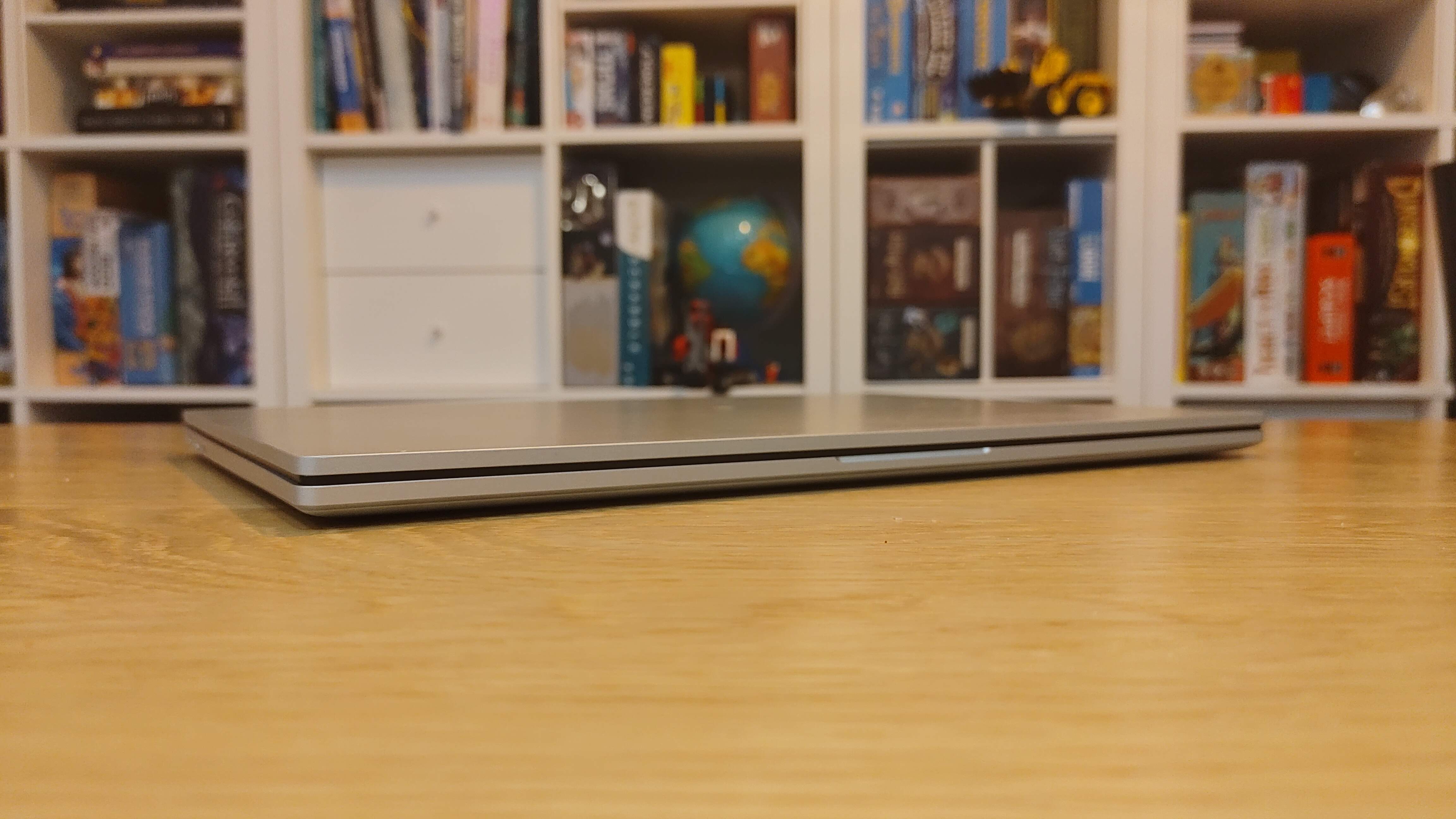
Buy it if...
You're desperate to try out Windows on ARM
Realistically there aren't many options out there yet for running Windows on a Qualcomm chip; if you fancy experimenting with it, or even developing for it at a stretch, this is a reasonably-priced machine with which to do so.
You need a laptop with staying power
If you can't be around mains power for any reason, the incredible battery life on offer here sets this apart from just about everything else in its class. It's a laptop that might well outlast your phone, which is quite the statistic.
You want to go mobile
Admittedly it may or may not be worth keeping your eyes peeled for the 5G version of the Galaxy Book Go, which also ups the processor specs, but if you're desperate for a connected laptop and can't possibly just fire up a hotspot from your phone, this is one.
Don't buy it if...
You want Windows performance
Outside of a handful of native ARM apps, virtually everything you'll run on this will be sluggish and irritating - and even the ARM apps are quickly overwhelmed by the lack of RAM on offer. This doesn't seem like a good example of Windows on ARM - and if it is, it's a big red flashing warning sign.
You want to actually see anything on screen
There are not enough pejoratives in the dictionary to describe the foggy, washed-out panel on offer here. Sure, it has a decent resolution for a machine at this price, but we'd have settled for a 1366x768 screen we could actually enjoy looking at.
You want a machine that'll last
We did not hurl this down the stairs, as much as we wanted to at times, but it's doubtful it would have survived: this is a very plasticy laptop, and the LCD wobble when moving the screen makes us worry the panel in particular may just implode of its own accord.
- These are the best laptops
